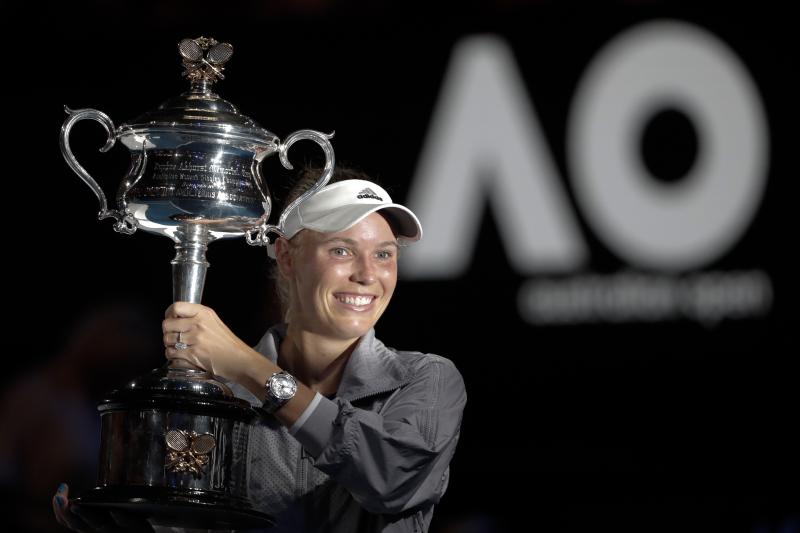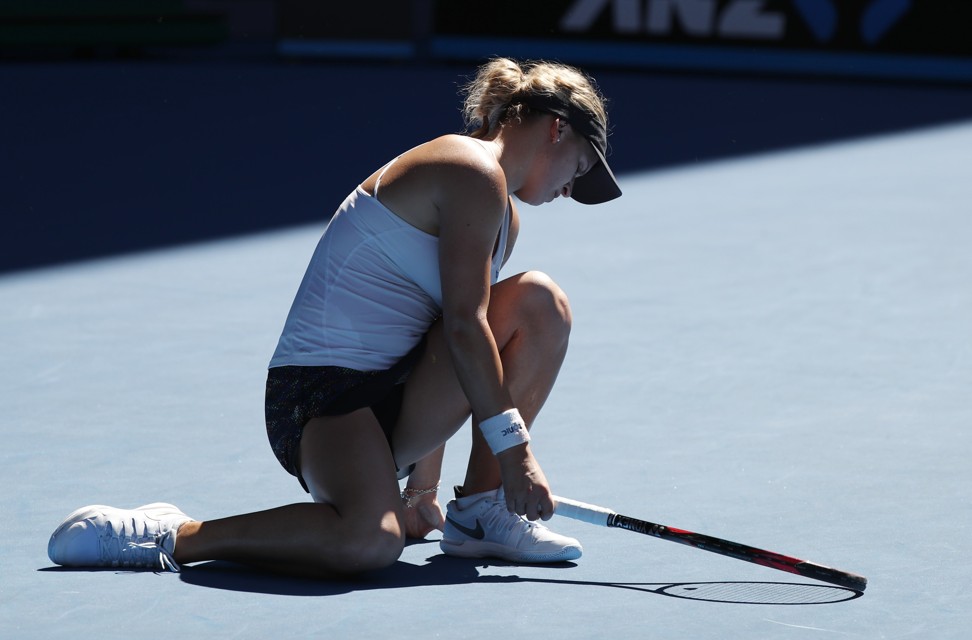I just got back from Australia a few days ago and wanted to share with one huge insight from this trip!
Everyone is still talking about the unbelievable Roger Federer, who at the age of 36 looks fresher than ever. He is the perfect role model and demonstrates true professionalism better than anyone else and deserves the utmost respect.
However, I want to tell you about a different moment this year Australian Open that has left a lasting impression on me.
It happened on day three of the tournament:
I was sitting in the second row of the centre court when Caroline Wozniacki played a 21-year-old Croatian girl called Jana Fett. It was super hot, and normally this match would not have been a game that would catch my attention.
Wozniacki was the clear favourite, but her opponent was playing great tennis, and so the match became pretty competitive.

And at one set all, a sensation was in the making:
Fett was leading 5-1 and 40-15, meaning she had two match points. In other words, Fett needed to win only one more to celebrate her biggest win, and knock out the second seed of the tournament and earn more money in one day that she probably saw throughout her entire career.
Fett was playing extremely confident, and I doubt there was one person in the stadium who didn’t think the match was over.
Of course, it would have been a huge disappointment for both Wozniacki and all her fans had she lost in the second round in Melbourne:
She has never won a Grand Slam, although she was already ranked #1 in the world and came to Australia in great shape, and just recently won the WTA Championships. Deep down even I felt pity as I was really hoping she would win this year’s Open.
But then the unthinkable happened:
Wozniacki not only defended two match points but won 7-5 in the third set. She then went on to win her maiden Grand Slam and become the new world number one in women’s tennis. And everyone who watched the final could see how much this win meant to her.

Wozniacki ‘Grand Slam champion and World No.1
Once again, a tennis match showed me how small is the gap between winning and losing, between feeling great and being extremely disappointed, and ultimately between belonging to the very best and being doomed into a life of mediocrity can be.
With one leg, Wozniacki was already boarding her plane back home.
A week and a half later, she was the Australian Open winner and the new #1 tennis player in the world.
But let’s take a moment and think about the loser- Jana Fett:

How did she miss that huge opportunity?
I do not want to take any credit from Wozniacki who is a fighter and who never gives up.
But Fett was playing great tennis and all she needed was one more point to make it into the next round.
Where exactly did she go wrong?
And what can we learn from this example about facing breakthrough opportunities?
These were the kind of questions that were going through my head.
Of course, I can imagine that the closer Fett was getting to the finish line, the more she was also thinking about all those ranking points, the money, the fame, and how this one game might transform her career.
This is completely natural.
But it also means that the pressure was on!
She must have been thinking thoughts like:
- I don’t want to mess this up.
- This could be my biggest win ever.
- Just don’t make any stupid mistakes now.
- What will I do with the prize money?
- Who will I play in the next round?
And the more she was asking herself these kinds of questions, the more she must have felt her heart rate go up and adrenaline kick in.
In these kinds of moments, it seems natural that we will want to control our nerves and our performance.
Fett might have told herself things like:
- Play aggressive.
- Don’t make any mistakes.
- Move my feet more.
But by trying to control her game she started to overthink her actions.
Psychologists often refer to this as paralysis by analysis, which one of the main reasons why we choke in those big moments where we so desperately want to perform at our best.
For Fett, this meant missing two backhands, and making another double fault at 5-3.
It also meant not being able to produce the same kind of tennis that had given her the 5-1 lead, which is why she never really recovered from her missed opportunities and ended up losing the match.
So why does this matter for you and me?
Well, it seems we live in a time where no matter what we do for a living, we also constantly face those crucial moments in which we want nothing more but to show up at our best:
- This could be a business meeting in which we are eager to demonstrate our negotiation skills and secure a satisfactory outcome.
- Or a job interview in which we want to secure a highly desirable position or job.
- Or it could even be on a hot date in which we want to show our most charming version of our self.
All these examples have one thing in common:
The stakes are high which is why it becomes natural for us to feel so anxious.
And that makes choking a possible outcome.
Now please don’t understand me wrong:
I am not saying that choking is a weakness.
To the contrary, I am convinced choking happens because we care so much about an outcome that we become over-motivated.
At the same time, without a doubt, choking is one of the most devastating things that can happen to any high performer.:
We may have waited years and years to trigger this big opportunity, and then when it finally arrives, we mess it up by saying something stupid, missing an easy shot or stuttering in front of our date.
How frustrating is that?
I am sure you would love to know how to handle those kinds of situations that make our heart beat faster and our hands get all wet and sweaty.
Just imagine what it would mean to know we can rely on ourselves in those crunch-time situations.
And I could give you lots of tips.
But instead, I will give you the ONE key mindset that I am convinced will really make a real difference.
And it will surprise you:
Here it is:
If you want to do well in big moments, then you must stop obsessing about the outcomes you desire and even stop caring about winning.
Yes, you heard me right, stop caring about results.
Instead, you want to focus on loving the actual battle and the process of whatever it is that you are trying to achieve.
It is that simple.
For a tennis player, this means loving to compete, while for a business owner it might mean enjoying new challenges.
I know you might think it sounds a little bit ironic that I am asking you to care less and not more about your biggest goals, and it took me many years to come to this conclusion.
But let’s think about this for a moment.
When we focus on winning, we are allowing our mood and wellness depend on a specific outcome that is not fully in our control.
For example, in tennis, we might lose a match because.
- Your opponent was lucky in the big moments.
- She played the match of her life.
- The referee made a few bad calls that really harmed you.
So we might feel upset, even though we did everything we could to win.
Moreover, by overthinking the scores, we also start to evaluate skills that we have been executing flawlessly in the past. So all of a sudden, we are focusing on strokes that we normally know and do intuitively–and this is when choking becomes so likely.
In short: People choke when they are close to achieving a goal that means a lot to them and hence begin to overthink the specific actions they should be doing:
For Fett, this might have meant thinking about what to do so she would not miss her backhand, rather than just trusting in her skills that she had developed over so many years.
And for a bachelor on a hot date, it might mean reflecting all the time what to say rather than allowing the conversation to develop some kind of flow.
So let me give you my Battle Beast Strategy so that you will stop choking in those big moments that matter so much.
First, do everything you can to show up prepared to big occasions.
Without preparation, you are doomed to fail. This means mastering your skills, but it also includes getting ready for the actual event.
In the same way, an athlete warms up for his competition, you need to get yourself into your ideal performance state. For example, this might mean visualizing your event and thinking through some of the difficulties you might encounter, and how you will overcome them.
Then, once the actual opportunity begins, completely detach from any result
I really want you to focus all your energy on giving your utmost, on loving the battle and on seeing these challenging moments as your opportunity to learn and grow.
Remember, as significant as this event might seem to you right now, it probably is far less important to your life than you think in the long run– after all, it is just one event!
And by trivializing its current significance, it will become so much easier for you to show up feeling more engaged, energized and present.
Ironically, this will make you perform much better!
Finally, debrief your performance and use every setback as an opportunity to learn and improve.
You can do this by asking yourself questions like:
- What went well?
- What could I have done better?
- And what did I learn?
Or you can talk through the event with a coach or mentor.
Now, will you stop choking once and for all by following these simple steps?
Of course not.
However, one thing is for sure.
By embracing this process, you will become a better performer eventually.
And that is the one thing you can fully control.
So here is my question to you:
What will you do differently next time you find yourself in one of those big pressure moments in which you want to perform at your best?
I would love to hear from you, so please let me know by leaving a comment below!
-Allon